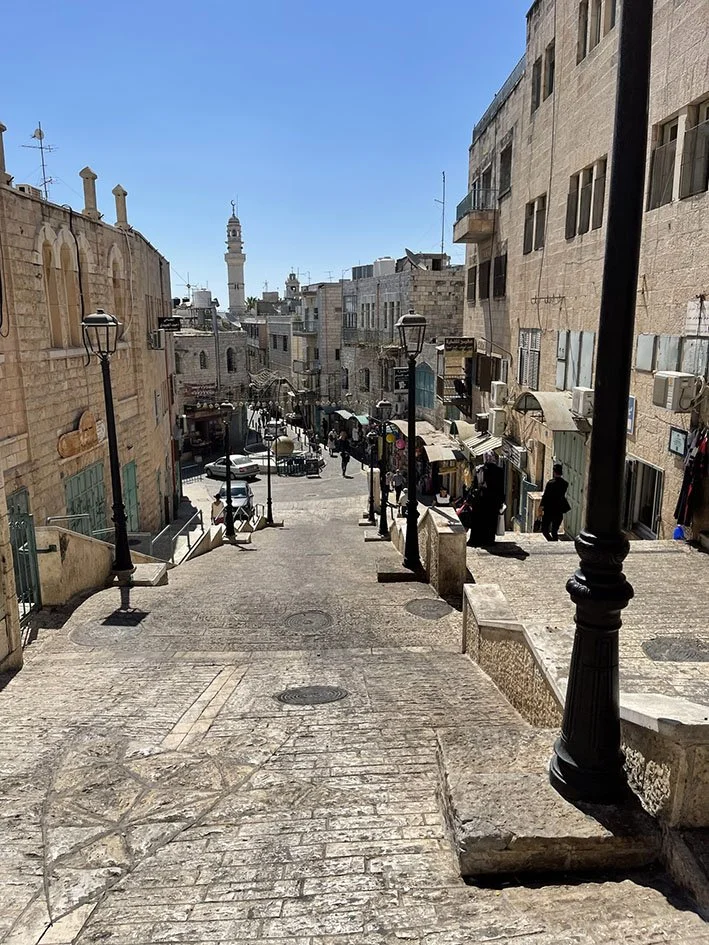NEW PROJECT - Sustaining Livelihoods in Bethlehem
October 2024
Embrace is funding a new project in Bethlehem to provide much-needed new employment opportunities and support six Christian business and NGOs that provide important services to the community.
Why is the project needed?
The past year has been exceptionally difficult for Palestinians living in the West Bank. As well as a security crisis caused by increased settler violence and military raids, they are facing a severe economic crisis which is impacting individuals, families and organizations.
Huge rise in unemployment and financial instability
More than one-third of the total employment of the West Bank was lost overnight, when the Israeli authorities imposed an immediate closure of the check points and revoked all Palestinian labour permits following the events of October 7th. Without permits to work in Israel, approximately 306,000 Palestinians lost their jobs.
Since then, the economic crisis has deepened. Movement restrictions and heightened insecurity has made travel around the West Bank increasingly dangerous. Workers are unable to reach their workplaces and the movement of goods and provision of services is severely disrupted.
Israel has also withheld tax revenues from the Palestinian Authority, meaning civil servants, including healthcare workers and public-school teachers, are not receiving their full salaries.
Tourism industry at a standstill
Bethlehem’s streets are empty of tourists.
While the whole of the West Bank has been affected, Bethlehem has been hit particularly hard because of its reliance on tourism. Bethlehem typically attracts up to 1.5 million tourists annually. The closure of the West Bank and the ongoing war in Gaza has brought tourism to a standstill.
The economic crisis is a threat to individuals, families and organisations. Families are struggling with a lack of income and are increasingly unable to pay for basic needs, including education and healthcare. This, in turn, is putting pressure on schools and healthcare institutions that rely on these payments to operate. With decreased income businesses and NGOs have been forced to lay off workers, halting production and services and leaving both owners and employees in a precarious financial position.
The economy has been caught in this downward spiral for nearly a year now, creating a vicious cycle of unemployment and financial instability for Palestinian households.
Many of Bethlehem’s shops and craft businesses rely on the tourist trade.
Stopping vital businesses and services in Bethlehem from closing
In response to this crisis, the new project run by our partner, Pontifical Mission for Palestine, will support six Christian organisations (a mix of businesses and NGOs) which are in danger of closing or of needing to reduce the services they offer. The project will give them funding to take on the new staff they need to continue serving their community, even in this time of economic crisis.
The funding will cover the salaries of 15 new staff for an initial period of six months.
Providing much-needed employment opportunities
Bethlehem in 2022. Many of Bethlehem’s shops and businesses have struggled to remain open this year.
In turn, this will provide much-needed employment for the 15 young people, all of whom are between the ages of 22 and 35 and have young families or dependents that rely on their earnings. All lost their jobs over the past year due to cuts made by local businesses and institutions because of the economic crisis.
The project will guarantee employment and income for these individuals for a period of six months with the hope that the organisations will be able to continue employing them beyond this period. Although in the grand scheme of things this intervention is small it will have a significant impact for these individuals and their families. By providing them with needed financial support it will help them not only meet their basic needs but also give them increased spending power to support other local businesses and families, supporting the wider economy in turn.
By responding in this way to the immediate needs of the individuals and organisations, the project aims to foster economic resilience, support the local economy, and help sustain the Christian social witness in Bethlehem during this time of crisis.
YOU MIGHT ALSO BE INTERESTED IN…
UPDATE FROM THE JERUSALEM PRINCESS BASMA CENTRE
“Travel to Jerusalem and around the West Bank continues to be challenging and at times dangerous…”
A YEAR OF GRIEF AND LOSS: “BUT WE REAFFIRM OUR CHRISTIAN WITNESS”
"The lives of the Palestinians, especially in Gaza, are not collateral damage; they are human beings, enduring unspeakable violence…”





